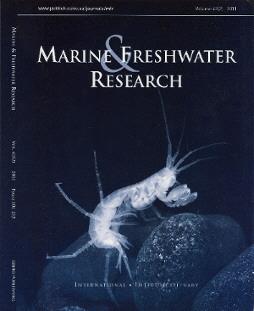Posted 17 September 2011

Cover of the Marine & Freshwater Research journal
A recent paper led by a new member of the Connected Waters Initiative, Dr Adam Hartland, has contributed new data on groundwater ecosystem structure and response to organic pollutants. The team of researchers studied the assimilation of sewage-derived organic matter (OM) by a groundwater food-web in an alluvial New Zealand aquifer.
Because there is no primary production in groundwaters, ecosystems derive all of their energy from "allochthonous" organic carbon inputs from terrestrial systems (e.g. losing streams). Point source inputs of organic contaminants result in increases in invertebrate biomass but may have irreversible consequences for food-web structure through losses of more sensitive taxa. This is at odds with water management practice which typically sees groundwaters as a net sink for organic matter and nutrients.
The relationship between organic inputs and microbial and invertebrate food-webs is poorly understood and is of importance for understanding groundwater ecosystem services. Carbon cycling in groundwaters is a potentially significant, but currently unquantified component of the global carbon cycle.
Hartland et al. used fluorescence and stable isotope techniques to demonstrate how sewage-contaminated groundwater affected the food-web and the composition of stygofauna (groundwater invertebrates). The biomass of oligochaetes and blind groundwater amphipods (similar to Phreatogammarus pictured on the cover) increased whereas many other species disappeared, apparently less tolerant of the organic pollution.
The paper constitutes one of the first published studies using stable isotope analysis to elucidate groundwater ecosystem structure.
Links

Professor Andy Baker features in American Water Resources Association ‘Water Resources Impact’, September 2020 edition.

The Connected Waters Initiative (CWI) is pleased to welcome Taylor Coyne to its network as a postgraduate researcher. If you’re engaged in research at a postgraduate level, and you’re interested in joining the CWI network, get in touch! The CWI network includes multidisciplinary researchers across the Schools of Engineering, Sciences, Humanities and Languages and Law.

The Grand Challenge on Rapid Urbanisation will establish Think Deep Australia, led by Dr Marilu Melo Zurita, to explore how we can use our urban underground spaces for community benefit.

On the 21 August 2020, CWI researchers made a submission to the National Water Reform Inquiry, identifying priority areas and making a number of recommendations as to how to achieve a sustainable groundwater future for Australia.

Results published from a research project between the Land Development Department (LDD) Thailand and UNSW has demonstrated how 2-dimensional mapping can be used to understand soil salinity adjacent to a earthen canal in north east Thailand (Khongnawang et al. 2020).